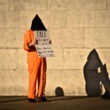Pucking Around With Science
For a while, the hockey stick carried all before it, perhaps because it seemed to correlate well with the observed increase in carbon dioxide in the 20th century over its 10,000-year baseline.—From Attorney General Kenneth Cuccinelli’s brief in the Michael E. Mann investigation
AUGUST WAS A GOOD MONTH FOR Virginia Attorney General Kenneth Cuccinelli. He authorized state law-enforcement officials to investigate anyone “suspected” of being in the United States without the proper legal documentation — something Arizona Governor Jan Brewer has been unable to accomplish with the backing of both houses of her legislature.
A federal judge ruled that a lawsuit Cuccinelli filed against the new federal health care law can move forward in district court in Virginia. And Cuccinelli’s subpoena of the private research papers of climatologist Michael E. Mann got its first hearing in state court.
The only legal action on the activist AG’s agenda that didn’t make headlines was the lawsuit Cuccinelli filed in an attempt to block the Environmental Protection Agency’s regulation of carbon dioxide emissions — after the United States Supreme Court ruled that the agency has the authority to do so.
Cuccinelli is a fair representation of the extremists who control a resurgent Republican Party.
He signed on with the “Tenther” movement working to resurrect a “state sovereignty” interpretation of the 10th Amendment.
He promised litigation that would challenge federal environmental regulation.
He warned that “the Roe v. Wade of marriage is coming and it’s coming in the next three years,” and said he would use his office to fight it.
Cuccinelli is a devout Roman Catholic, whose seven children are (or will be) home-schooled through the sixth grade before being enrolled in Catholic secondary schools.
He has advanced the Roman Catholic doctrine that homosexuality is acceptable — until it is acted upon.
“My view is that homosexual acts, not homosexuality, are intrinsically wrong,” Cuccinelli said. “And I think … I happen to think that it represents — to put it politely, I need my thesaurus to be polite — behavior that is not healthy to an individual and as an aggregate not healthy to society.”
Cuccinelli quickly delivered on his faith-based commitment. In his sixth week as Virginia’s attorney general he directed state colleges and universities to remove from their anti-discrimination policies any language protecting gays and lesbians.
He also commissioned a new state seal for his office, covering an exposed breast of the Roman goddess Virtus.
Cuccinelli retreated from that decision in response to criticism from mainstream media outlets in Virginia. Such as the Roanoke Times‘s “What a boob” editorial, reminding readers that the exposed breast that offended the pious attorney general had been uncensored since the image of an immodest Virtus was lifted from a Confederate battle flag.
Cuccinelli’s attempt to make the lives of gays and lesbians more difficult and to act as state censor are parochial issues confined to one state. It is his litigation strategy that has extended his reach beyond Virginia.
Cuccinelli filed his lawsuit against the health care bill in March — exactly five minutes after the president signed it into law.
And he has employed a two-pronged approach to blocking the federal regulation of greenhouse gases. He filed one suit to enjoin the EPA from regulating emissions. And he has undertaken a separate investigation that he believes will discredit the scientific conclusion that human activity is altering the climate.
HAT TRICK—At the Conservative Political Action Conference (CPAC) last February I watched the peculiar spectacle of young men in khaki pants and blue blazers waving hockey sticks in the air. I knew that the boys with their hockey sticks could only spell trouble for Dr. Michael Mann.
CPAC is a bellwether of Republican public policy. Mann is a Pennsylvania State University climatologist who used a “hockey stick theorem” to describe the trajectory of man-made global warming. He is one of thousands of scientists who contributed their work to the Intergovernmental Panel on Climate Change (IPCC).
Before Professor Mann moved to Penn State, he taught at the University of Virginia, which is where Cuccinelli found his legal hook.
The legal action he filed against Mann’s former employer, the University of Virginia, is a collateral attack on the scientific conclusion that human activity is heating up the planet, and a direct attack on the reputation of Dr. Mann.
Mann was one of the IPCC scientists whose e-mails and research materials were leaked by a hacker who broke into the computers of the University of East Anglia’s Climate Research Unit (CRU).
An e-mail from a British researcher, which used the term “trick” to describe Mann’s interpretation of data, was central to the “Climategate” scandal the CPACers were protesting.
An inquest in England and an investigation conducted by Penn State have disposed of the notion that the CRU and IPCC scientists manipulated their data in an attempt to prove global warming. The word “trick,” it turns out, is nothing more than a term used in the scientific community to describe an elegant way to solve a problem.
SUING SCIENCE—Cuccinelli was undeterred. If his investigation of Mann has received less attention than the Virginia AG’s suit challenging the EPA, it is no less outrageous.
Alleging that Dr. Mann might have falsified data in applying for five grants he obtained while a professor at the University of Virginia, Cuccinelli issued a civil investigative demand (CID) for all of the professor’s communication with 39 of his colleagues in the scientific community and any UVa staff members — a blatant assault on academic freedom.
When University administrators retained a Washington, D.C., law firm to represent them, the Virginia attorney general seized the moment and set out to discredit the widely accepted scientific conclusion that human activity is dangerously overheating the planet.
Cuccinelli’s 107-page brief (posted at Washington Spectator.com) includes a scientific critique written by someone on the AG’s staff. The brief is signed by Assistant Attorney General Wesley Russell, but when I reached him by telephone he refused to tell me who wrote it.
The author of the brief includes selected “Climategate” e-mails and describes the CRU climatologists as a “small clique of scientists who viewed their mission to include attempts to silence critics in a way that made the practice of science adversarial and biased.” The author sets out to place the IPCC and CRU studies in the context of flawed “Post-Normal” science, while describing the authors of the studies as a collusive cabal working to keep the theory of anthropogenic climate change alive so that they have steady work.
The critique’s author cites one study that criticized Mann’s “hockey stick” theory, without mentioning that half of the editorial board of the journal that published the study resigned in protest of its publication — and that the study was funded by the American Petroleum Institute.
The brief relies on another questionable scientific paper commissioned by Texas Republican Congressman Joe Barton (a climate-change denier) in 2006, when he was chairman of the House Committee on Energy and Commerce.
And the AG’s “scientific critique” employs falsehoods — or glaring errors — to discredit Mann, including the claim that the Medieval Warm Period and the Little Ice Age “disappeared” in the original “hockey stick” paper published by Mann and his colleagues.
The Union of Concerned Scientists has posted a point-by-point critique of the attorney general’s filing.
But there’s more here than specious science. The scope of Cuccinelli’s CID, in the words of the private counsel retained by the university, is “sweeping in time and substance.” It demands all research material written over an 11-year period when Mann, as a UVa associate professor, worked on five climate-science grants. It also orders the production of “any documents prepared … before this time period which relate thereto.” In a word, everything.
Cuccinelli is using the discovery process to revive a “Climategate” story that has been thoroughly examined and discredited. If Mann’s private correspondence is turned over to the AG, it can easily become part of the public record, available to climate-change skeptics who would selectively use it to attack the near-universal scientific consensus that the burning of fossil fuels is overheating the planet.
The Michael Mann CID hearing was held in August, and will be covered in a subsequent issue. No oral argument for Cuccinelli’s EPA lawsuit has yet been scheduled.
Even if you disagree with him, you have to give Ken Cuccinelli his due. He was elected to a position that makes him managing partner of a 129-member law firm underwritten by the taxpayers of the Commonwealth of Virginia. Now he is using that law firm to pursue ideological goals he defined in his campaign for office.
He told voters what they were going to get and is now delivering. Look for him in court — and on the short list of Republican vice presidential candidates in 2012.
MINOR CONVICTION—In the August 1 issue, I wrote about the bribery conviction of former Alabama Governor Don Siegelman. A reader suggested that the prosecution of Paul Minor was as politically motivated as that of Siegelman. Both cases required a second trial and a second cast of codefendants, after federal prosecutors failed to convict the high-value defendant in the first round. Both trials were run out of Main Justice, with Assistant AG Noel Hillman calling the shots and Department of Justice lawyers from Washington sitting at the prosecutors’ tables. Both men were convicted of honest services fraud, under a statute pared down by the Supreme Court in June. Both men also were subjected to punitive extremes once they were incarcerated. Siegelman was manacled, shackled and shuttled from prison to prison. Minor was denied permission, first to visit his wife when she was hospitalized with a brain tumor, and then to attend her funeral.
“Minor didn’t get the media attention that Don Siegelman got,” Oliver Diaz said. Diaz was a justice on the Mississippi Supreme Court when he was indicted in Paul Minor’s first prosecution. Minor was a successful Mississippi trial lawyer whose firm had earned $70 million in the tobacco litigation initiated by former Mississippi Attorney General Michael Moore in 1994. Minor was also a very large donor to Democratic political campaigns.
In 2003, Minor was charged with lending Diaz $73,000 to win his support on issues that would come before Mississippi’s Supreme Court. Diaz was charged with accepting the $73,000 bribe. Prosecutors missed one critical fact.
“During the campaign, I told Paul that because of his contributions to my campaign I would never be able to participate in any of his cases at the court,” Diaz said. “I would have to recuse myself. And I did.”
Diaz had participated in a libel appeal that involved Minor’s father, a legendary Mississippi journalist who had made his name on the front lines of the Civil Rights movement. “When [John Minor’s case] came up to the Supreme Court, we sit on panels of three. I was not on the panel that heard the case. But I was one of nine in a unanimous opinion affirming the trial court decision,” Diaz said.
That was not enough to convict Diaz or Minor. Yet within days of the first trial, U.S. Attorney Dunn Lampton indicted Diaz again, this time on tax evasion charges. Diaz was exonerated. Minor was reindicted.
Minor’s second trial in 2007 involved two lower court judges for whom he had guaranteed large loans. The fact situation is appalling: more than $100,000 in loan guarantees to judges before whom Minor would try cases; and Minor deftly steering one large civil suit into the courtroom of one of those judges. But a compromised judicial election in Mississippi is not necessarily prosecutable. When Minor was convicted, Mississippi election law didn’t even require judges to declare loans they had accepted from supporters.
The federal judge presiding over Minor’s prosecution instructed jurors that they could convict if they could infer that Minor tried to cultivate the favor of the two judges whose loans he secured. As in the Siegelman prosecution, no proof of a quid pro quo was required. Minor was convicted and is serving an 11-year sentence.
Minor’s prosecution ties in to the U.S. attorney scandal through Lampton, the U.S. attorney who twice prosecuted him. (Lampton actually assisted a DOJ attorney flown in from Washington.) Appointed U.S. attorney by George W. Bush after losing a Congressional race, Lampton had made the initial U.S. attorney firing list, where he was rated as “weak.” Once he began investigating Paul Minor, his name was dropped from the list.
Diaz reminded me that we’ve seen this movie before. “I think it came out of Texas with Rove and Bush. … They moved into Alabama and took over the Alabama Supreme Court. And in the 2000 election, they began to take it into other states. Mississippi was one.”
Corporate Republicans had pushed legislatures to enact tort reform, yet judges were striking down legislative restrictions on plaintiffs’ lawyers and plaintiffs. “They had to take over the courts,” Diaz said.
President George W. Bush said as much in Mississippi in 2003, just after Diaz and Minor were indicted on the eve of a gubernatorial election in which Republican Haley Barbour was challenging incumbent Ronnie Musgrove — a Democrat supported by the plaintiffs’ bar.
“One way to make sure this is a good state in which to create jobs is to have a governor who is willing to … take on the plaintiffs’ attorneys,” Bush said. “You don’t want the greatest wealth accumulation in any state to be in the hands of the plaintiffs’ lawyers.”
By the time they finished, the Republicans not only shut off trial attorneys’ sources of income; the high-level prosecution was a warning to other political donors.
“There’s a local angle to this story,” Diaz said. Local and incestuous. Diaz’s opponent in the Supreme Court election was Keith Starrett, who had served as Lampton’s assistant prosecutor when Lampton was a state district attorney. Starrett’s legal secretary was Donna Lampton, a cousin of Dunn Lampton. Leslie Lampton, another cousin, works for the Mississippi Commission on Judicial Performance.
After Dunn Lampton twice failed to convict Oliver Diaz, he went at him from another angle. Acting as a private citizen, Lampton delivered Diaz’s prosecution files to the Judicial Performance Commission, demanding an investigation.
Lampton struck out for the third time with Diaz and retired after an automobile accident. Starrett was appointed to the federal bench by George W. Bush in 2004. (The assistant U.S. attorney who prosecuted Diaz is now the acting U.S. attorney; Obama has yet to fill the U.S. attorney slots in Mississippi.) Diaz is suing Lampton and his cousin Leslie. “It’s not the money,” Diaz said. “It’s what this has done to my professional reputation and my life.”
Former U.S. Solicitor Theodore Olson is representing Minor in an appeal to the United States Supreme Court. More on both cases in a subsequent issue.






0 Comments